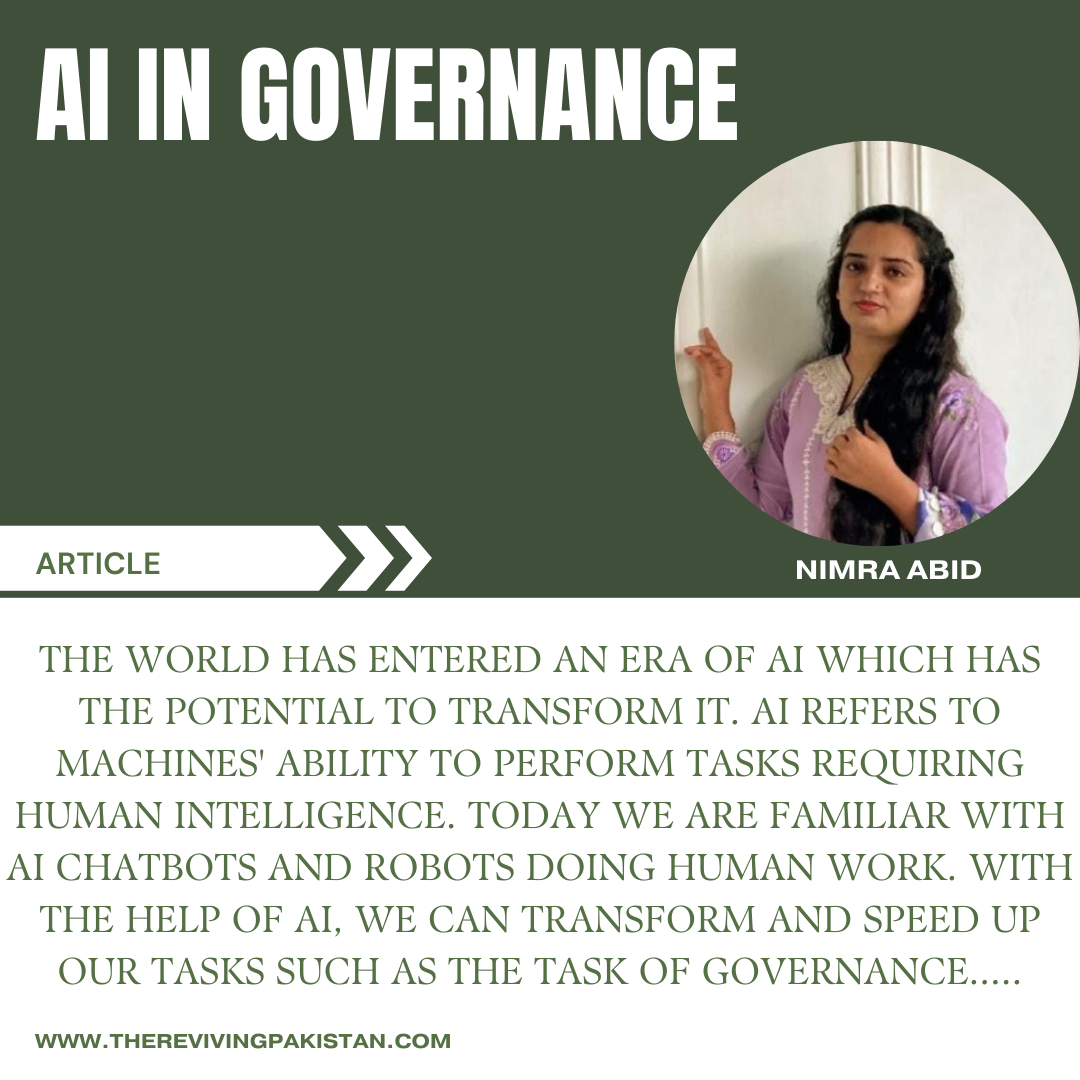
Nimra Abid
The author, a BS Chemistry graduate from Sargodha University, discovered a passion for writing during their CSS journey and is now eager to share their unique perspective with readers, allowing them to see the world through their lens.
The world has entered an era of AI which has the potential to transform it. AI refers to machines’ ability to perform tasks requiring human intelligence. Today we are familiar with AI chatbots and robots doing human work. With the help of AI, we can transform and speed up our tasks such as the task of governance. Governance is the regulation of an organization or institution by set rules. AI impacts governance in various ways such as by performing data analysis and predicting various scenarios. It develops the public service delivery process and effectively detects and prevents fraud, assesses security risks, plays a crucial role in policy formulation, and improves decision-making in governance. The AI virtual assistants are used to provide personalized support to citizens such as in education and healthcare. It is used to improve the management of natural resources and is effective for smart city management. However, the adoption of AI in governance is posed with challenges of biases, lack of accountability and transparency, privacy, and security risks along with job displacement and inequality challenges. To harness the benefits of AI in governance, the Government and other stakeholders have to monitor carefully to address the challenges.
AI in governance is helpful as it does data analysis and predicts policy outcomes. Natural language processing techniques and advanced algorithms analyze the behavior of citizens, assist the policymakers to anticipate the possible outcome of any policy, and transform it accordingly. It helps policymakers to anticipate various scenarios such as disasters and disease outbreaks. Covid-19 could have been dealt with better strategies if AI anticipated it. Now we should apply it to tackle the challenge of climate change to avert various disasters emanating from it, i.e., floods and earthquakes.
It improves public service delivery. The Chatbots and virtual assistants available 24/7 improve the efficiency of work and reduce human workload. The chatbots should be present in public offices to give information about government affairs. They help to register the queries of citizens. It provides personalized treatment in healthcare, based on medical records and genetic data. AI can easily detect fraudulent activities such as tax evasion. Employing AI in the tax system can increase tax revenue.
Another application of AI in the governance system is the detection of fraudulent activities and assessment of security risks. It detects and responds to cyber-attacks. It helps to prevent data breaches by detecting anomalies, i.e., unusual data access or unauthorized activities. AI can also flag suspicious credit card transactions deviating from customers’ spending patterns and analyzes the user’s login patterns and browsing behaviors to identify suspicious activities and give alerts. AI surveillance systems identify potential security threats using face recognition algorithms. Employing AI in public offices is helpful to mitigate corrupt practices as it will automatically detect unusual behavior.
AI also plays a crucial role in policy formulation. It assists policymakers to analyze the social outcomes of any policy before implementing it. Any policy is effective if it is implemented, and for implementation, it has to be liked by masses, so by AI we can forecast the fate of new policy and amend it if necessary. The outcomes of elections can also be anticipated and altered accordingly. For example, Cambridge Analytica’s mission in the USA was to transform surveys and Facebook data into political messaging weapons. AI algorithms detect a person’s wishes and by visuals convert them into a necessity; therefore, AI is a useful tool in trade and advertisement.
In the education sector, AI can do wonders. It is used to provide personalized assistance to students and to help assess knowledge according to everyone’s learning capacity. AI is a good teacher when it comes to quality learning. It helps pupils to understand difficult concepts in a creative way and will provide videos and audio to enhance learning. It will eliminate the rote learning method of memorization. The system of online education can be said to be the first step in using AI in education, but it requires development to a large extent.
Also, in smart city management, AI has applications. It improves natural resource management by detecting the exact location of resources and analyzing the areas where they are needed more. AI-powered early warning systems are helpful to manage floods and earthquakes. In public transport, it helps to predict real-time traffic conditions and suggest alternative routes. The AI-powered systems also adjust traffic signal timings. It enhances citizen services by providing personalized support and citizen engagement.
AI is used effectively in environmental monitoring; it detects air, water quality, and noise pollution and gives warnings about it. It is also helpful in waste management and will detect the areas where waste management resources need to be allocated. It can provide recycling methods and sustainable ways to dump waste without affecting the environment.
Various challenges are posed to employing AI in governance. First, the risk of biases and discrimination. The AI algorithms and data are fed by humans initially, so they can be biased. Second, lack of accountability and transparency is also a major challenge. The AI data can be easily manipulated by its creators. Third, it faces privacy and security risks; for example, if an AI system is employed in an administrative system, a cyberattack will leak secret data. Last but not least, it will replace the jobs of many people. Chatbots and robots instead of humans will exacerbate the unemployment issue. To harness the benefits of AI in governance, the government and other stakeholders have to perform keenly and monitor the whole process carefully to eradicate the problems. Not adopting AI is not a choice, as without adapting, it will bring an end to mankind.
To conclude, AI has the potential to impact the governance system as it is beneficial in data and predictive analysis. It also provides services in policy formulation, decision-making, fraud detection, risk assessment, personalized assistance, and smart city management. It faces challenges such as bias, lack of transparency, security risks, job displacement, etc. However, careful handling and a system of checks and balances can be effective to get rid of the threats and generate benefits of using AI in governance.

